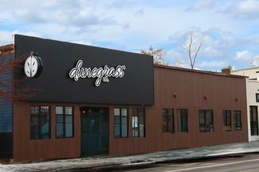
The Hunt for the Perfect Caramel Apple
Four places to sample fall’s sweetest treat
By Al Parker | Oct. 21, 2023
Along with color tours and pumpkin spice everything, a crunchy, sweet caramel apple is one of the most beloved traditions of autumn.
Some say caramel apples date back to 1936, when Hunter’s Candy, a mom-and-pop sweet shop in Moscow, Idaho, began selling them. Hard-coated candy apples had been around since 1908, but Hunter’s created a whole new dessert by bathing their apples in sugary caramel. During World War II, these candy-coated Jonathans or Winesaps were shipped overseas to U.S. soldiers in Korea, England, and Japan.
In 1948, a Chicago family named Kastrup founded the Affy Tapple Company, and their caramel apple recipe is still used today for their “The Original Caramel Apple” lines.
Soon, savvy northern Michigan candy merchants answered requests for the delicious candy-coated wonders. Some are simple classics, while others are bathed in an array of chocolate flavors, a variety of nuts, and toppings like coconut, sprinkles, and candy corn. We at Northern Express took on the important and daunting task of trying as many as we could on our hunt for the perfect caramel apple.
Alpine Chocolat Haus in Gaylord
Owner Bruce Brown says the key to an outstanding caramel apple is simple.
“Quality apples, quality caramel, quality chocolate—if one fails, it’s not a good apple,” says the affable Brown, who opened his downtown candy shop in 1985. Since then, it’s become a landmark for those who love chocolate…and apples bathed in caramel and chocolate.
Brown starts with a fist-sized Granny Smith that is shipped in from California. He wasn’t able to find a local supplier who could provide the quantity he needs; in addition to his Gaylord store, he has Alpine Chocolat Hauses in Boyne City, Sault Ste. Marie, Manistee, and Plymouth. Each week, Brown and his team produce a whopping 3,500 caramel apples at their kitchen operation in Gaylord.
Apple sizing is designated by the number of apples that can be packed in a 40-pound fiberboard carton. The largest packed size is 48, meaning 48 apples per case. A lot of caramel apple makers use apples sized 88 to 100, but Brown relies on heftier 72-count apples, which typically are about three-and-a-quarter inches in diameter. “I need to set my apples apart,” he explains. “I like the size of these apples—size is very critical.”
His caramel is heated to 236 degrees, and the apples are hand dipped and cooled. Then they are bathed in high-quality chunk chocolate, not disc chocolate, which often contains paraffin wax to enhance appearance.
Brown offers dark chocolate and milk chocolate for most of his apples. Then comes the enormous variety when they are finished with chopped peanuts, roasted pecans, sea salt, coconut, cashews, M&Ms, and an array of other toppings.
“We do 35 types of apples,” explains Brown. “Including a pink one for breast cancer awareness, some with Michigan State and U of M logos, chunky peanut butter, candy corn, and others.”
Prices range from $9 to $13. His masterpiece is The Ultimate Caramel Apple.
“We take a Granny Smith apple and have some fun with it,” he says with a laugh. “It’s dipped in our gooey caramel, then dipped in our silky milk chocolate, then topped off with salty potato chip pieces—coated in chocolate of course—sea salt, and drizzled with more milk chocolate. What’s not to like?”
Amical in Traverse City
Most caramel apples are sold in chocolate shops, so it’s pretty unusual to find an eatery which features these tasty treats on its menu not just as a seasonal special in the fall, but year-round.
“They’re easily in the top three of our most popular desserts,” says general manager Jeffrey Libman. “This is one of our iconic dishes.”
Amical has served the caramel apples since 1994 when pastry chef Dena Schacher was making desserts. Dena was married to Mel Schacher, bass player for Grand Funk Railroad. As Libman tells it, while Mel and the band practiced next door at the State Theatre, Dena was crafting caramel apples, one of her personal favorites.
“Dena came up with the apples, and we’ve tweaked it over the years,” recalls Libman.
Dena made a few for customers, word spread quickly, and soon the treats were on the menu, where they remain almost 30 years later.
“We use Granny Smith apples, because they’re tart and crisp,” says Libman. “Then we dunk ’em in caramel [from Grand Rapids] and drizzle them with Belgian, white, and dark chocolate. Then come pecan halves.”
At Amical, there’s an ongoing contest among servers who cut and plate the apples.
“It’s a friendly competition,” jokes Libman. “We have one barista who cuts them into eight to 12 pieces and stacks them like Lincoln Logs. They’re plated beautifully and topped with a dab of heavy cream.”
Amical sells 12 to 18 caramel apples a week, but that number explodes near the end of the year. “From Thanksgiving to Christmas, we’ll sell about 400 apples,” estimates Libman. “And when we present them to our guests we often hear, ‘That’s not what I was expecting!’”
Grocer’s Daughter Chocolate in Empire
It’s not a stretch to say that this must-stop candy shop’s caramel apples (pictured) are a rare sort of treat. For one thing, they are only available on weekends from mid-September through the end of October.
Production takes place on Thursdays and Fridays, producing only 70 apples or so for each weekend. While other shops are producing thousands of caramel apples during the fall, Grocer’s Daughter is just fine with offering about 500 during its limited six-week run.
Another factor that makes Grocer’s Daughter different is the apples they have carefully chosen to use. While Granny Smiths are pretty standard, Grocer’s Daughter goes with Honeycrisps that are grown at an Empire neighbor, Sleeping Bear Orchards. The orchard crew knows just what the shop needs for its apples and cleans the fruit before delivering them.
“It’s about as local as you can get,” says Gabi Maddox, who teams with Casey Davis as the shop’s caramel apple dippers extraordinaire. “I really enjoy dipping the apples. The nice thing about chocolate is that it’s forgiving. And you can re-use it. We really make an effort to save all [the trimmed chocolate] that we can.”
This year they offer two options: dairy-free dark chocolate and milk chocolate. They coat those tasty Honeycrisps in their house-made caramel, then drizzle them in delicious, direct-trade chocolate.
“It’s really labor intensive,” says chocolatier/owner Jody Hayden. “But that’s pretty much for chocolate in general. It’s really caramel artistry.”
Kilwins in Petoskey
The Kilwins story began at this store run by Don and Katy Kilwin in 1947. It’s now expanded to dozens of locations across Michigan, along the East Coast, down in Florida, and as far west as Colorado.
All of their caramel apples are classics, but none is more basic than the “Perfect” caramel apple. It starts with a fresh, crunchy Granny Smith that is hand-dipped in the historic shop’s original caramel recipe, developed by Don himself. That sweet caramel is still cooked in a traditional copper kettle during a three-hour process that results in a smooth, creamy caramel topping for this treat that’s been a customer favorite for more than 70 years.
Other apple offerings include milk chocolate or dark chocolate with sea salt, apple pie, pecan and pecan turtle, and peanut caramel. Prices range from $8.99 to $10.99.
Trending

Michigan’s Marijuana Tax at Work
Cannabis has become a big business in northern Michigan, and local governments are putting tax dollars earned from dispensar… Read More >>
California Sober: Why People Are Switching from Alcohol to Weed
They call it “California sober.” Generally speaking, this term applies to folks who use marijuana but abstain f… Read More >>
The Legacy of Student Activism
“It’s a physical letter to your representative,” Alex Tank says when asked to define the word “prote… Read More >>


